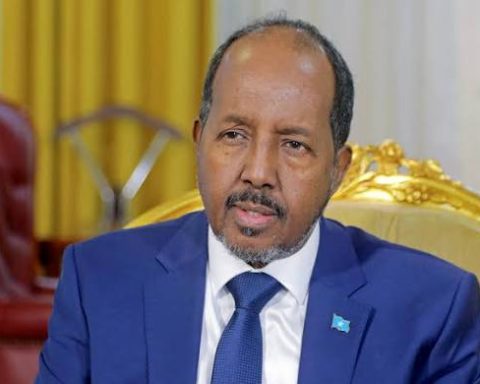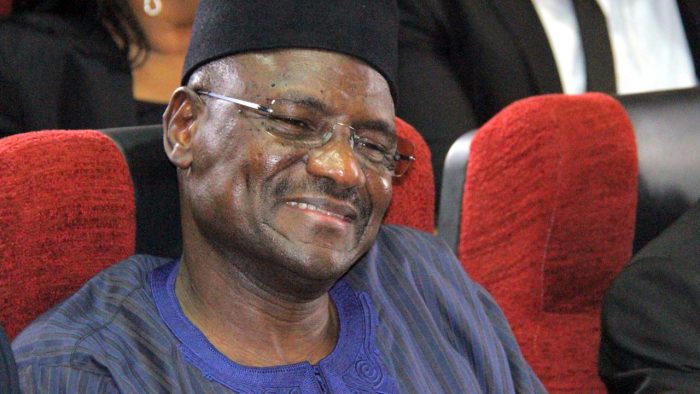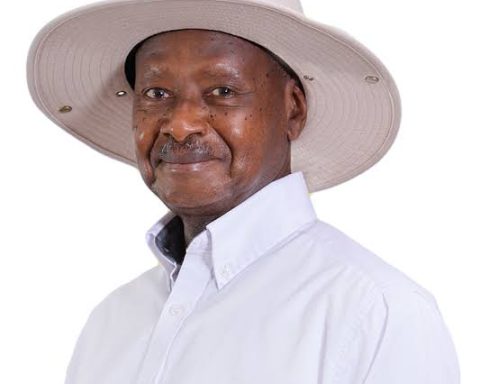RENOWNED Nigerian writer and social activist, Chimamanda Ngozi Adichie has joined voices with those urging Europe to return artefacts taken from African nations during colonial era.
The vociferous Pan-Africanist made the call at the Humboldt Forum, Berlin in Germany, where she stressed that the materials regarded as African art, represent the cultural identity, dignity and religious inclination of people in the region.
Join our WhatsApp ChannelBelow is the full transcript of Chimamanda’s courageous speech that went viral on the Internet.
IKENGA: African Sacred Object, Repository of Spiritual Meaning
WHEN I was researching my second novel, Half of a Yellow Sun, which is set during the Nigerian Biafran war that started in 1967, a woman told me a story about her elderly father. It was early in the war and they were in the Biafran hometown, feeling relatively safe because the war seemed far away. Then suddenly they heard the loud terrifying sounds of bombing very close to them, and they knew that they had only minutes to leave their home and run into the interior for safety, before the Nigerian soldiers arrived.
The elderly father was a wealthy man, but the only thing he rushed to take with was his Ikenga, a piece of wood, a beautifully carved piece of wood, but it wasn’t just a piece of wood, it was also the repository of spiritual meaning. The Ikenga represented his Chi, his personal spirit as well as his ancestors, his guardian angels.
I was struck by this story. This man, facing the possibility of never seeing his home again, chose the thing that mattered most to him. Of cause, he cared about his material possessions, but he believed that those things can eventually be replaced, while his Ikenga was irreplaceable.
There are Ikengas in various museums all over the world today and it is easy to forget as we stare and admire them behind cold and clinical glass barriers that these are objects that are religious, spiritual, and sacred.
Art lives in history and history lives in art. Much of what we call African art are as well documents that tell stories. Some are literal in the storytelling like the beautifully ornate Benin Stool that was sent to the Oba of Benin by his people when he was exiled by the British and which he looked at and immediately could deduce from the carvings, the State of his British plundered land.
Other sculptures and carvings are more metaphorical, they speak to the dignity of the people, to their worldview and to their aspirations.
Some of the early Christian missionaries across the African continent were very keen on destroying African art, carved African deities which they told the Africans, were just magic. I cannot help but riley wonder what could be more magical than the story of a man who dies and then magically rises again; a man who also manages to magically give his body as bread, and I say this by the way, as a newly returned Roman Catholic.
The point is that belief systems vary, and as long as they feed the spiritual needs of a people, they are valid. We cannot be dismissive of a belief system merely because it is unfamiliar to us, just as we cannot be dismissive of a history because we are uncomfortable with it.
How Europe Distort African History of Colonization
So I would like to tell a small story about a Nigerian woman who is married to a Belgium and has lived in Belgium for many years. She said once that she was shocked that her son, while being taught Belgian history was taught nothing about Congo. “They teach my son in school that he must help the poor Africans” she said, “but they don’t teach him about what Belgium did in Congo.” Now, if Hassan does not learn that the modern Congo State began 100 years ago as the personal property of a brutal Belgian King, who was desperate to get wealthy from ivory and rubber; if her son does not learn that the hands of Congolese people were chopped off with rusty axes for not producing enough resources to meet a cast, because we collectively acknowledge that it is so. It is not that Europe has denied its colonial history that would be too crude; it’s instead that Europe has developed a way of telling the story of its colonial history that ultimately seeks to erase that history.
The former French Prime Minister, Nicolas Sarkozy gave a now infamous Speech in Senegal in which he said I have not come to deny mistakes or crimes; mistakes were made and crimes committed, but no one can ask the generation of today to expiate this crime perpetrated by past generations. This is central to the story that Europe tells itself about its colonial history. It is a story that basically says, yes colonialism happened, but, and whatever comes after the ‘but’ is the focus of the story. What the focus on the ‘but’ does is that it absolves, it frees Europe of responsibility of a significant and traceable connection to the African present and it allows Europe the glow of charity.
But the truth is that the past does not merely tell us what happened yesterday. It also merely illuminates what happens today. If we acknowledge that present-day Europe is shaped by the renaissance of 600 years ago, by the enlightenment of 300 years ago, then surely we cannot say that what happened merely 100 years ago in Africa no longer matters; it matters.
We are gathered today in this reconstructed palace, a beautiful place, but also a place that represents Germany’s nostalgia for imperial times. When Kaiser William the second lived here, German troops were killing children, women and men in South West Africa; this building says that German history matters even in a romanticized form.
The history of Africa, Asia and Latin America must matter as well. We cannot pick and choose which histories and which point of views that still matter, because to do this would be an ugly exercise of brute power.
And speaking of power, here is a headline I just read in a German publication. The headline says ‘where do Africa’s treasures belong?’ Now imagine this headline differently; imagine if it said, ‘where do Germany’s treasures belong?’ It would be a redundant question because, of cause, Germany’s treasures belong in Germany. But the question would never even be asked, because there would be no circumstance in which it would be, because of power and so it seems to me that what we are fundamentally grappling with in this space in all of these questions about the Humboldt forum is power. Unequal power and how we navigate unequal power relations and there has always been to me something shabby about unequal power relations, the victory feels colorless, almost unearned.
Call On Germany To Toe Part Of Courage, Return To Africa What Isn’t Theirs
So, I spoke of Belgium and its colonial history but what of Germany and its colonial history? Do school children here learn about Namibia, what was called the German South West Africa? Do school children know that one hundred thousand Herero people were murdered by the Germans, do they know of the Whales that were poisoned, do they know of the women used as sex slaves and others as slaves in German camps? Do they know of the Nama people killed and of the Majimaji revolt in German East Africa and why should they know? Because, to tell only part one part of a story is essentially to lie.
A story is true only when it is complete. Germany is Beethoven and Germany is back and Germany is also its colonial atrocities that has resulted in hundreds of African skulls being stored in the basement of museums here in Berlin; skulls of men whose spirits cannot be at rest; men who could well have been my great-grand father had I happened to have been born in Eastern Germany, rather than Western Africa.
It is only fair to fully own all of the stories of Germany. All countries have parts of their pasts that they’re not proud of, that they would rather forget, but it takes courage to face those parts and bring in some light, and this is time for courage, the courage to hear dissenting voices such as those of the people who are outside right now protesting, they should be heard and included, they have valid concerns.
The courage not to merely say we take your criticism, but to follow it with action; the courage to say, we were wrong, the courage to say about art acquired illicitly, ‘this is not ours, tell us what to do with it.’ The courage to do provenance work and to actively use local knowledge; the courage to act and to act now and not become crippled by endless planning and endless talking; the courage to believe that it can be better.
We cannot change the past but we can change our blindness to the past. And why by the way, is the term ethnological used for art from certain parts of the world and not for other parts of the world.
In discussing some of this art that we term ethnological, and I would argue that the language itself already suggests a hierarchy of value. When we talk about this art, we were told that they cannot be returned to Africa; for example because Africans will not take good care of them. It is not merely condescending to say I cannot return what I stole from you, because you will not take good care of it; it is also lacking in basic logic, since when has the basis of ownership been taking good care of what is owned.
This position is paternalistic arrogance of the most stunning sort. It does not matter whether Africans or Asians or Latin Americans can take care of the arts stolen from them;, what matters is that it is theirs.
The brilliant Nigerian artist Viktor Hickameno put it much better than I could and in very Nigerian terms, he says, ‘if I come and steal your wrapper, and I say I won’t give you back your wrapper because you will not tie it properly around your waist or you will not wash it well and so the colors would fade or this or that, all are irrelevant. The wrapper is mine and I can do with it what I will. Give me back my wrapper because it is mine. The metaphorical wrapper for those of you who are befuddled by wrapper, it’s a piece of cloth. It should be returned for the reason that Ahika men are illustrates which is respecting the property of others, but also because Europe has defined itself as a place of certain values, progress, liberty, fraternity, tolerance, individual rights and most it all, the rule of law.
A nation that believes in the rule of law, cannot possibly be debating whether to return stolen goods, it just returns them. So, if the dignity of those from whom the art was stolen does not matter, then surely this idea should matter that Europe should be what it claims to be, live up to the ideals with which you define yourself. I should pause here and note that sometimes these conversations run the risk of sounding like empty moralizing or like asking for the impossible or the unrealistic or insisting on an unattainable purity and perfection.
Obviously I don’t think everything should be sent to the countries from which they came. Not everything was stolen. But those things that are sacred, those things for whom people were killed, those things that have in them the stain of innocent blood should be returned.
Obviously we do not have all the information, but there are facts lost in unrecorded history, but we can draw reasonable conclusion based on information that we do have. We can deduce for example that the Ingonso, the beautiful sculpture of the founder and guiding spirit of the Ensui people of Cameroun, a former German colony, could not possibly have been obtained under benign circumstances because why would you willingly give up your guiding spirit. It is also important to remember that not all wounds are visible, some wounds we carry in our hearts inherited from our parents, passed on to our children.
But this discourse is of course not just about the Humboldt Forum, it is about museums all over Europe in France and Vatican, in Britain and I must acknowledge that Germany is the first of the powerful European nations that has made a gesture towards returning the Benin bronzes, but it is also interesting that the announcement said that a substantial amount would be returned which made me wonder how this would be determined and by whom.
And it is equally interesting that it is British colonial loot rather than German colonial loot that is being returned by Germany. But still, it is progress and Germany’s action, this gesture towards righting what is wrong must be acknowledged. My acknowledgement of it is not to say that the work is done, but that the work has started, and that perhaps, a place like the British museum and I know that Neil is here which owns the majority of the Benin bonzes might perhaps be inspired by the German decision and hopefully the British museum will rethink its policy of retain and explain which is unacceptable.
So, this is the Humboldt Forum. A forum usually implies among other things a space created for a free exchange of ideas, one can only hope that the Humboldt would live up to its name as a space for true intercultural and trans-cultural exchange of ideas in mutual respect between the cultures. But this rhetoric free exchange of ideas must be practical and by that I mean such things as travel visas, it must be easy for people from Africa, Asia and Latin America who should participate in this conversations to get travel visas.
The Humboldt Forum was conceived as a place to tell the universal story of the human race from multiple perspectives. This is a commendable idea, but it is incomplete, because again, we must confront the issue of power, who tells the story, who is the teller, and who is told about, who decided that African art should be labeled ethnological; who has the right to exhibit the other. Can the Humboldt Forum be an opportunity, can it become among other things, a project of remembering solemn, honest and mutual respect.
In conclusion, I want to say that I believe very much in dialogue, and I really believe that we can recreate the world by acting more courageously. To act with courage is to have concrete hope in a better future, we carve out a small space of the world, we shape and we reshape it and in that way small slice by small slice we walk slowly, yes, but we walk on the path to real progress.
Courage and hope are intertwined. Courage is an act of hope and hope is born of courage. Act of courage create hope, and there is nothing more essential to the human spirit than hope. So, here is the courage, thank you.
Victor Ezeja is a passionate journalist with seven years of experience writing on economy, politics and energy. He holds a Master's degree in Mass Communication.














